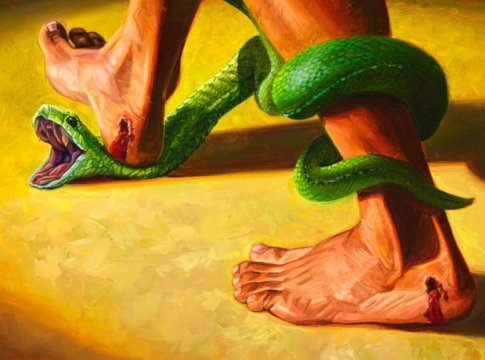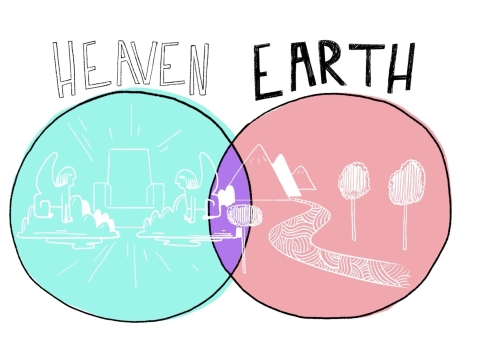
A thorough understanding of the Bible reveals that a significant amount of the text is devoted to prophecies against idolatry. Despite [the stringent prohibition of idolatry], the Israelites persistently abandoned their God and followed other gods (Exodus 20:1–5). Israel and Judah were ultimately driven into exile due to idolatry (2 Kings 17). What exactly is an idol, and why is worshiping idols such a powerful lure for people? These questions will be considered in this essay.
An historical example
A crucial Bible chapter for comprehending idolatry is Exodus 32. It has every aspect of idolatry. What was happening? In the desert, the inhabitants were bored. Their God, the Lord, was unseen, and Moses, the man who communed with Him, looked to have vanished from this world. The people created a picture of the God who had taken them out of Egypt because they were in desperate need of something concrete and definite. They considered this image to be their lord, giving it their everything. But only a few weeks before, their true Lord had forbade the venerating of other gods [and pictures]! What is this idolatry, and why did the Israelites continually commit this sin?
The human tendency to idolatry
Humans are inherently drawn to meaning-giving objects that are greater than themselves. Idolatry is the substitution of a desire for something controlled from creation for this longing for [the one and only real God]. You may, after all, rule a god that you create. An idol is incredibly dependable. With sacrifice, you can shape it to fit your needs and preferences. As the Israelites believed when they brought the ark into battle against the Philistines, you drag it along to accomplish a triumph (1 Samuel 4). Others, like King Jeroboam, who forbade the Israelites from traveling to Jerusalem for worship, utilized idols to further their political agendas (1 Kings 12:26-33).
Idols draw you away from the true God
Idolatry is dangerous. Idols have a tremendous impact on those who revere them even though they are unreal. Furthermore, the pernicious aspect of idolatry is that man makes an image of himself in the first place and then, ironically, regresses into the likeness of that image. Idols, for instance, give the impression that security and safety are attainable. Israel was pulled farther and farther away from God—the one One who is truly capable of providing fulfillment and protection—the more idols they chased. Although it guaranteed bondage, the idol offered freedom. Though it created uncertainty, the idol offered security.
People who are consumed by their idols or ideals start to resemble them more and more. The Israelites started to resemble the calf they had created more and more: unyielding, heartless, blind in one eye and deaf in the other. Similarly, we are also starting to resemble the modern values of leisure, fun, and business. We consequently develop superficiality, vanity, and an obsession with material possessions. We lose sight of the only real God in the process.
Are idols real?
Indeed, idolatry is ridiculous. How could you possibly make the God who created you? Isaiah 44:14–17 makes fun of this mindset and behavior. Serving idols is chasing an illusion, and the main issue for the person doing so is that they are unaware of it:
“He cuts down cedars, or he chooses a cypress tree or an oak and lets it grow strong among the trees of the forest. He plants a cedar and the rain nourishes it. Then it becomes fuel for a man. He takes a part of it and warms himself; he kindles a fire and bakes bread. Also he makes a god and worships it; he makes it an idol and falls down before it. Half of it he burns in the fire. Over the half he eats meat; he roasts it and is satisfied. Also he warms himself and says, Aha, I am warm, I have seen the fire! And the rest of it he makes into a god, his idol, and falls down to it and worships it. He prays to it and says, Deliver me, for you are my god!”
In 1 Corinthians 8:4-6, Paul adds that idols are unreal and that we shouldn’t be afraid of them. However, Paul also notes that the wicked spiritual forces that do exist—the devils and demons—eagerly take advantage of people’s propensity for idolatry (1 Corinthians 10:13-22). Because of our idolatry, we worship the devil. When we devote our time to materialistic or esoteric pursuits, the devil is happy.
The consequences of idolatry
Paul outlines the effects of human idolatry in Romans 1:18–31. The splendor of the eternal God has been replaced with an image of a transient creature by humanity. The order has become anarchy, wisdom has become foolishness, reverence has become perversity, and truth has become a falsehood. In other words, man has become fatal because he has replaced the original (God) with an image.
A person truly harms his creation as the representation of God when they turn a creature into an idol. An individual who becomes lost in idolatry is shown to be a fallen being. He has lost, distorted, and hidden his individuality. He is no longer the real him. As a result, we search in the wrong location for ourselves. We believe that our sentiments, our work, our values, our cultural subgroup, or anything else can help us discover who we are. The source of idolatry can be found in all of these things, and it is through them that God’s wrath is made known from above (Romans 1:18).
Many of us worship many other spiritual idols, even though the majority of us do not worship any physical idols these days. A few have already been addressed above: finances, family, credit, influences, and so forth. All it takes to observe the tremendous impact these things have is to look around you. Not only do atheists frequently focus on things that distance us from God, but so do believers. Idolacy is the practice of placing anything other than God. Therefore, let us turn to Jesus, who delivers us from the evil influence of idols and is the real Image of God (Colossians 1:15) (Colossians 1:13-14).





